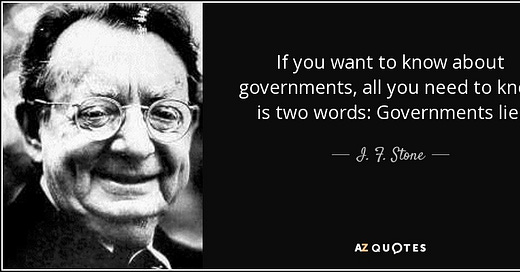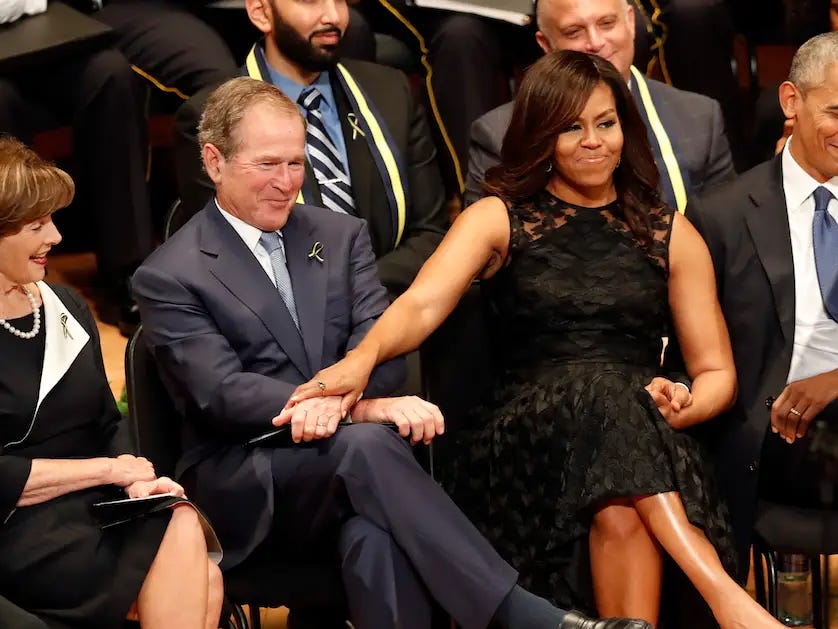From Assange to 9/11 to Supply Chain Failures: When Can You Believe Government Explanations?
That's not a trick question
News of Julian Assange’s release is welcome indeed, though as many have pointed out, the fact that Assange was forced to plead guilty to violating the WWI-era anathema-to-American-principle Espionage Act to earn his freedom means the gun of government prosecution remains pointed at any tempted do what he did:
Despite the fact that the plea was carefully crafted to say the state never proved its case, the Justice Department’s insistence on admission to the top count of violating the Espionage Act means this will remain a sword over the heads of anyone reporting on national security issues. Governments have no right to keep war crimes secret, but Assange’s 62-month stay in prison is starting to look like a template for Western prosecutions of such leaks.
The government wanted its war crimes covered up, and they succeeded in that. No one will prosecute the pilots who murdered civilians for sport, no one will prosecute the commanders who ordered the kills, and certainly no will prosecute those whose policy it was to prosecute this war in the first place.
Looking at you, Mr. Bush.
But I want to broaden out from Julian Assange to something more general.
When the Saudi Government Broke American Foreign Policy
When, on September 11, American foreign policy was taken apart, what were you told? Certainly not the truth.
Consider the recent release of yet-more explosive 9/11 information, this involving — what else? — more proof of the complicity of the Saudi government. This video explains most of it:
The full 60 Minutes segment is here:
This is, of course, damning for two governments: The Saudi government whose naked complicity in this terrible killing becomes more obvious with each passing year; and the U.S. government, who obviously covered this up. As both videos make clear, the tape of Al-Bayoumi’s surveillance was sent to the FBI within a week of September 11.
What did they do with it? That’s obvious, isn’t it. They hid the evidence of a Saudi-sourced attack and lied to the public about who was responsible.
So, listen to Saagar Enjeti in the first video above again. “Everything we were told about 9/11 in the aftermath of the event … was a lie.”
Then ask yourself, what can we believe when the government speaks to us? If your answer is, “Probably some of it,” you’re probably right. But you’ll never know which part is right and which is a lie.
When The Rich Broke the Global Supply Chain
When, during the Covid pandemic, you found store shelves bare and picked clean, what were you told? Certainly not the truth.
The following video, also from Breaking Points, contains an interview with Peter Goodman, who talks about his new book, How the World Ran Out of Everything.
We think we know why the supply chain broke down during the Covid pandemic. Goodman asserts we don’t:
The supply-chain breakdowns of the pandemic years, he insists, “were not an accident, but rather the outgrowth of a concerted strategy” of increasing concentration in industries from cattle slaughtering to container shipping, so “companies with dominant positions in their industries were positioned to exploit the pandemic as an opportunity to lift prices.”
The fault, in other words, lies with the rich — just as the rise of China lies with the rich, who traded America’s future for a few dollars more. It lies with publicly traded monoliths and with private (vulture) capital, whose grip on executives made long-term safety strategies nearly impossible.
What Can We Believe?
Your bottom line and mine: Have you heard any of the stories reported above? Have you heard them responsibly sourced and reported, especially as they occurred? Likely not.
No one told you the Saudi government attacked the U.S. on September 11, though many suspected as soon as the hijackers were known. The government and media together told you the opposite — the government by nakedly lying, the media by dutifully printing what they were told.
No one told you that the reason you couldn’t find toilet paper, hand sanitizer or the ingredients to make it, was because our rich still weren’t rich enough yet. Just as no one of note — the government, the corporate press — is telling America that the reason the economy’s so bad is simple greed.
We live among predators, we honor their deeds, and no one tells us not to, not on the news that, in the minds of the many, gives credibility to thought; not from the bully pulpit of any top leader.
Enjeti in the first video above thinks the 9/11 lies are ancient history, events we can’t change and must acknowledge and move on. I disagree. We can learn from all this. Start here:
When the government and elite media explain a major event — assume they’re lying unless they prove they aren’t.
This includes everything. All of it. Things you want to believe (you know what I mean) and things you don’t (does the CIA really still do that?).
Maybe they’ll be proved to be right, the government, but when will we know it?







My formative years featured two events, the JFK assassination and the Vietnam War which led to a deluge of government lying.
The definitive compendium of lies about the JFK assassination is the "Warren Commission Report", https://www.archives.gov/research/jfk/warren-commission-report. What I conclude from that document is that several of the individuals responsible for the assassination were members of that commission.
Vietnam is another rich trove of government bullshit. Let me point out one egregious justification for marching my young butt off to the jungle: "The Domino Theory." For anyone younger than fifty the "Domino Theory" is getting dusted off again for the Ukraine conflict. Ya know, we better march on Moscow before Russian hordes sweep through Oslo, Munich, Vienna, and Milan!
I encourage skepticism about our government's motivation. Resource rich foreign places leave our billionaires salivating for conquest. Those people are the motivators, not us.
It's made even worse by the incestuousness of the Beltway. With my own eyes I have seen politicians, staffers, etc romantically involved with reporters. I have seen senior correspondents and the subjects they cover side by side cheering their children at St. Albans sporting events. As George Carlin once said, "It's a big club, and you ain't in it!"